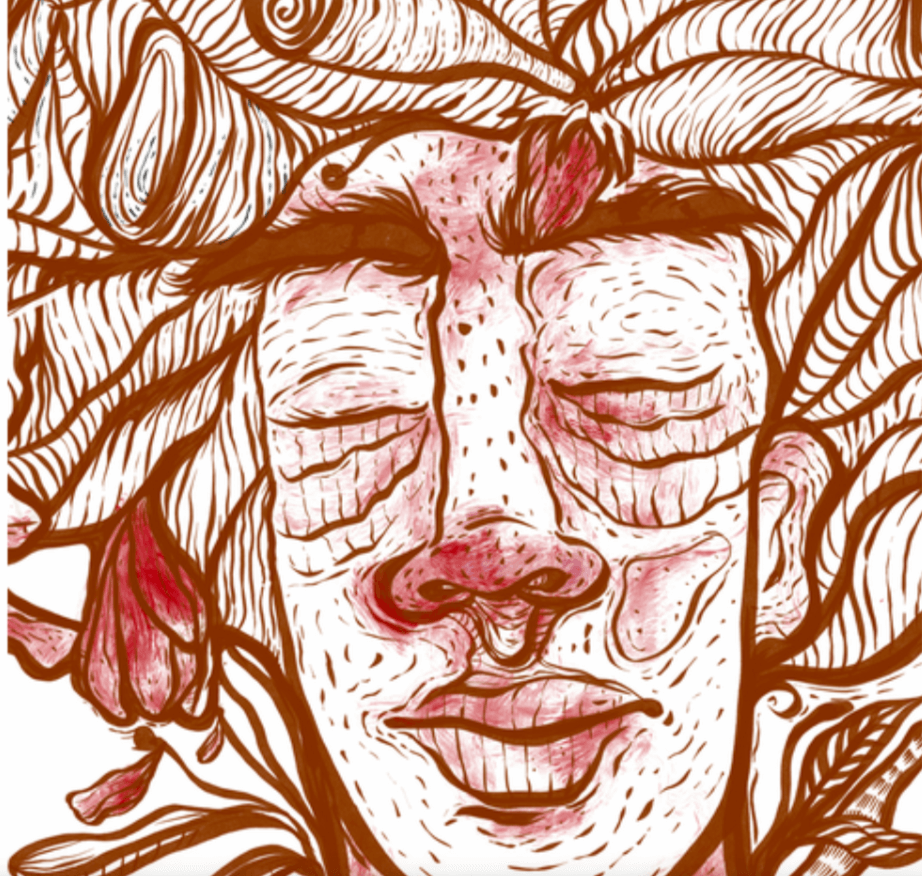
Awá women, mountain people in the city
In Colombia, reservations are areas in which indigenous peoples hold the collective title to the land and have the right to self-govern. There are more than 700 reservations in the country, making up almost 30 percent of the total territory. In this podcast, we hear women from the Awá group in Nariño who sought to escape poverty and violence in Pasto, the departmental capital city, and instead found modern slavery. When they intended to return to their reservations, the indigenous authorities refused to recognise them as indigenous, claiming they had lost their identity.
Through a circle of women and weaving, they supported each other, they built a political consciousness and they became determined to return to their land.
They are now exploring the possibility of setting up their own women’s reservation, but they found a number of obstacles: first, they need to be recognised as indigenous women and then they were required to have the circle recognised as a form of government. Only then will they be able to receive governmental funds to buy the land, the land that will make for the first indigenous reservation run by women.
(Narrator) “Feeling at home”, “being at home” are everyday expressions that we use when the place where we are is part of our identity. To be where we belong.
And, if we speak of identity, Colombian indigenous organisations have claimed, on many occasions, in various spaces and through different strategies, their willingness to identify themselves as indigenous and to be recognised as such always, generally around a territory that is the pillar of who they are and the way they understand the world.
What happens with cultural identity, with personal identity, when – as a result of the diverse realities of the indigenous peoples of the country – it is necessary to leave the territory behind, migrate, move voluntarily or be forced for one reason or another?
Today we present: Awá women, mountain people in the city.
(Mariana) My name is Inés Mariana Astacuas. I am from the Camawari reservation.
I left when I was a child, when I was eight years old, in search of… something good, right?
To help my family because my brothers did not have clothes. I left to help, to look for something… How should I say this… something good.
But it didn’t go as I thought, right?
I came with my godmother, but then my godmother… What happened was that my godmother left me with another lady. And when my godmother left, I stayed with the lady working, but they didn’t pay me there. I worked for free.
I will hold my sadness back.
I continued working and, with time, I began to realise that I was growing up.
Physical abuse, yes, they called me Indian, right?
I did not know how to talk, write or read. When I … My godmother who left me said, well, “let’s leave the girl, but let’s make sure she gets to study,” and the lady said “okay, we are going to let her study,” but it was not the case. She did not tell the truth. She never taught me to write or read. Never! She did nothing to teach me. Then she asked: why would we have to teach this Indian?
Then, another lady came and said “no, she is human too, right? She has feelings too.”
Since I was a girl… I hardly like to tell this, but, well, you kind of have to tell yourself: “it is true, I’m human, I’m Indian, right?” You are humiliated for being indigenous.
Well, after all these things happened, well … I went working from house to house. From there, as I already grew up, I said “I’m going to my mother’s”. But I did not bring any money, I did not bring any money to help my family, and it was not what I thought. From then on, I said “no”. I did not return to the lady I used to work for.
I began working for another lady, and she paid me, and then she said: “I’m going to send you to study. I’m going to send you to study at night.”
But well, I didn’t understand too much… But I do thank her because she did give me, as they say, an education, right? Because, I learned to read, write, all that. Not so well, but enough that I can defend myself. I can sign documents and all that.
I worked with the lady for 15 years before I left. I began helping my brothers. Things changed, and every year I went to see my family.
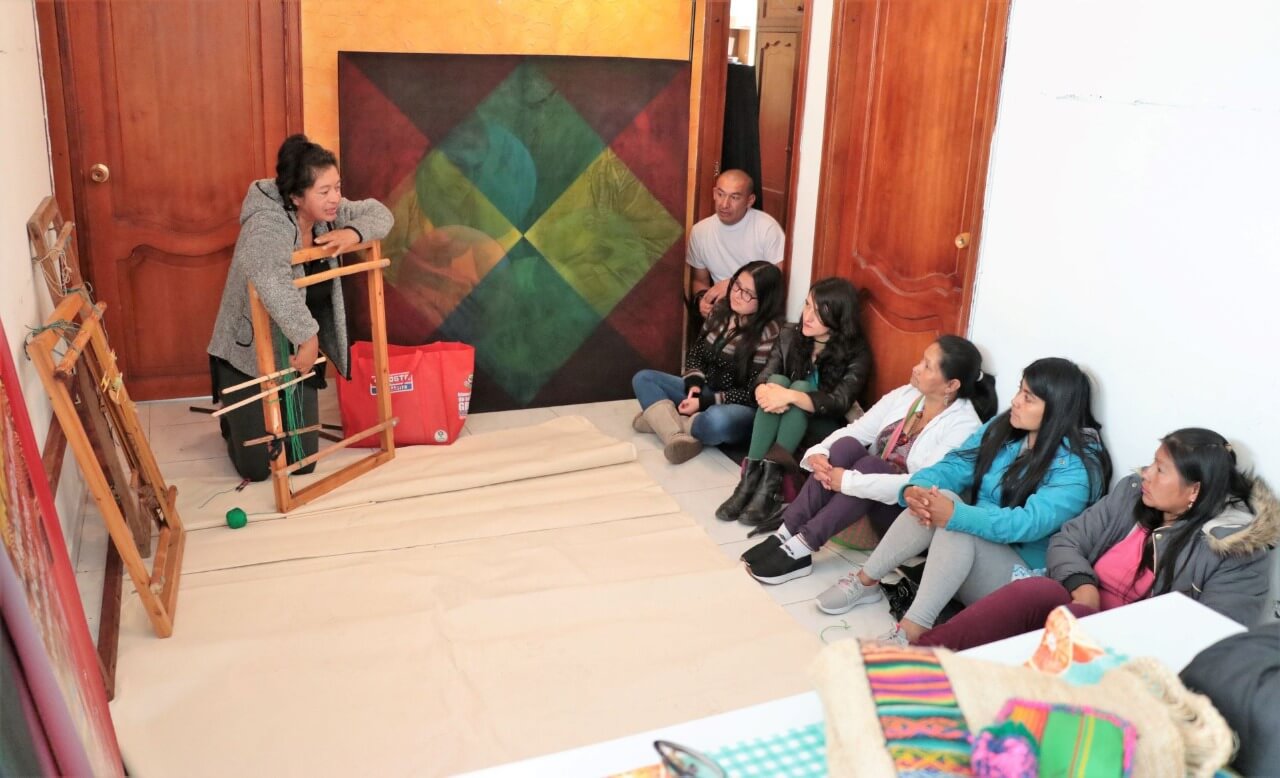
(Gladys) My name is Gladys Guanca. I am from the Chimbagal reservation.
When I left, there was no reservation; it was only called Chimbagal, an area in the municipality of Barbacoas in southern Colombia.
I left at the age of 14. I left to look for a better future because the poverty was harsh. We did not have enough to eat. I left to seek a better future. I thought I could find a better future here in the city.
I left with my sister, my older sister, and I went to work at a family home.
It was quite painful. My boss was complicated, she tried to hit me. Let’s say she pushed and pulled me because I couldn’t do things well because I was still a child.
I had to babysit, iron, wash, do all the chores around the house, and the pay was very bad. I was paid 15,000 (about 3.50 USD). Sometimes they didn’t even pay me.
I worked there for four years before I went home again. But then I returned to continue working with the same woman. At 16, I left that house. I no longer worked for her.
I went to work with another woman. And that lady gave me the opportunity to study at night. I studied, but it was very dangerous to walk at night. I didn’t know the city very well. I was robbed many times. I was left without a notebook, without a purse, they took everything from me.
So, I was very scared, and I didn’t go to study anymore.
At this place, I met my partner who is my husband now. I have three children after living nine years in common union. I got married, now I am married.
I returned to my territory, but with my husband.
Around that time in 2005, things were very complicated. That was a difficult time over there. I returned. I was with my husband, and we were fine.
My husband set up a mechanical workshop in Juní, and he worked there. We were doing very well.
And then… I don’t know what happened. The paramilitaries were going to kill him. We had to leave. It was a miracle that he was saved.
We left displaced. We had to leave as we were. We left everything we had.
We left and I never went back.
“I hardly like to tell this, but, well, you kind of have to tell yourself: “it is true, I’m human, I’m Indian, right?” You are humiliated for being indigenous.”
Mariana
(Narrator) Inés and Gladys are Awá indigenous women. They were born in the territory. They remember it.
They have their own surnames. They are daughters of the Awá people even though they had to leave it very young, driven for reasons that are often painful and difficult to talk about.
They are women who today are part of the group of weavers of Awá, a circle of women that was organised in the city of Pasto, seeking not only to meet with their peers, their equals, but also wanting to become free, looking in the mirror of the others in search of a self-definition that implies an individual exercise of determination of their own cultural identity.
To recognise themselves as part of a group, to find themselves, in order not to be a loose link lost in the concrete of the city.
(Mariana) Where we started with Alejita… Well she was our other friend because…
We began getting to know each other as Awá women here in Pasto, see?
Aren’t you interested in recognising ourselves as family, as Awá women?
I said: “that would be great, I would like that,” that was almost five years ago. I said “yes”, and then, we began to meet with the others. We met in the park, the park that is here in the neighbourhood of Santiago.
I said: “I know some Awá women too”. I said I knew them well, each one from different territories, right? Alejita said “then we have to meet”. I said that it would be good. And days later Alejita began.
She said “OK, let’s collect the names of the women. How many women, where are they from?”
And we started to work. It was work because one sort of evaluates risks. “That woman seems from over there, from my territory, that one looks like someone from my village.” [Mariana is implying that it could involve some risk for the women to seek other Awá women because it could potentially warn their employers, the indigenous authorities and Colombian authorities that they were organising. The women had been in arrangements close to modern slavery from they were very young and had had very limited agency to change their lives, so to gather publicly to demand better living conditions was in no way familiar to them and they were unsure of which consequences it might have. However, they had no other way to get in contact with them than to go on the streets. If they saw someone they thought could look like an Awá woman, they would ask for her surname. Surnames are associated to the individual reservations, and even huge reservations can have only five or six difference surnames.]
As I have always been more outgoing, I would go and say:
“Good morning, I want to ask you where you are from.”
Then she would say to me:
“Why do you want to know?”
“No, I ask you because you look like… You could be from my town.”
“Yes,” she would say, “I’m from Altaquer.” [Altaquer is a settlement in the municipality of Barbacoas.]
“Ah, I am also from Altaquer.”
And so, one got to meet the others. That is how it was with my friend María. She told me: “I am from such and such territory.”
“Ah well.”
And, thus, we became friends. And we brought more people. We used to meet to get to know each other, right? More and more women.
So, we said: “Because we are not all registered, right? Until now. We want to have an indigenous census so that we can be recognised.”
So, I said: “See, I would like that too,” and then the other women joined. I said: “to do that we need to start working, recognise each other and unite, right? One person alone can’t do much.”
“When we meet, I feel as if I were in my territory. Yes, it brings back many memories because we look at each other. We are all ‘no ones’. Meeting gives me peace of mind.”
Gladys
(Gladys) Through friends that I was already getting to know when I was studying, I met two Awá women who were also studying with me.
I assumed that, given the surname, she could be a Guanga or an Astacuas [very well-known family names that indicate belonging to a given indigenous community], so I said: “She seems to be from my land, she seems like family.”
So, I would talk to her, and we became friends. And she would tell me her story about having been gone for so long. She would tell me how she had left and why.
And we started making more friends and more friends, and we were gathering more and more women. At that time, it was Alejita, Alejita Pascal, she invited me. I did not know about this before she invited me, but we became friends. She is the one who thought out the initiative, who invited us.
“Meetings! Let’s go!”
Well, she encouraged us to continue. We made fabrics and bags with Guajiro threads and told the stories of why we had left as girls. Of why some had been stolen as girls, others had left voluntarily, but all had been deceived.
They offered us studies and clothing when we had no clothes. We walked barefoot. So, they offered a pair of shoes and happy we went. I have several friends who have been deceived like that.
(Narrator) Awá women, diverse women who share similar stories, all of them settled in the municipality of Pasto, the municipal seat of the department of Nariño.
For Inés and Gladys, as well as for all these women, being indigenous means feeling that they are an integral part of the cultural heritage that their ancestors have bequeathed to them.
It also means recognising themselves as belonging to the Awá indigenous people and claiming themselves as members of it, despite not living in the territory.
However, for the indigenous authorities of the Awá, and in the eyes of other institutions, the task is not easy. The petition to be recognised as indigenous has legal and social implications that must go through a constitutive legal – and far from easy – process.
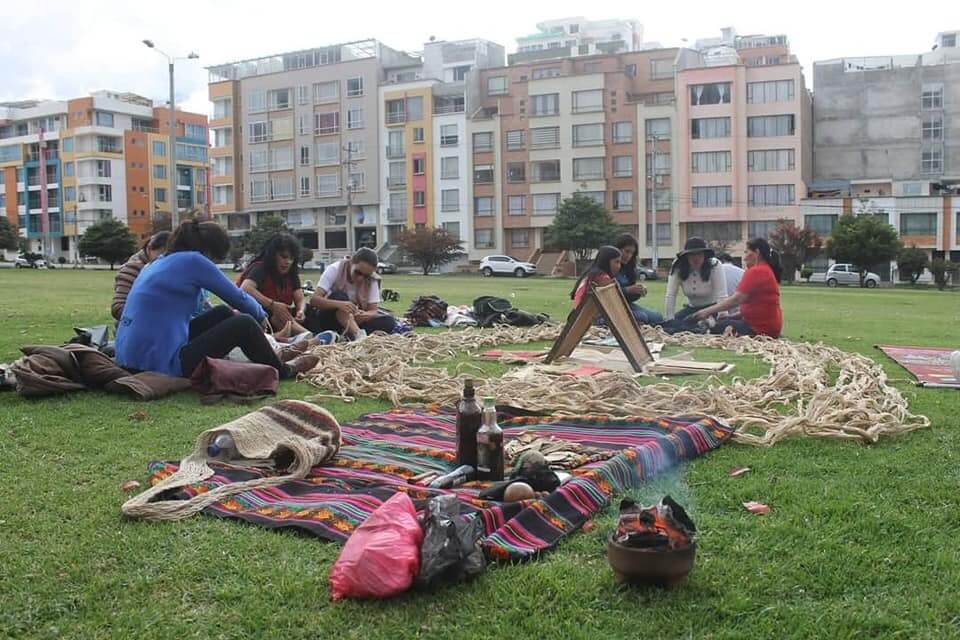
(Paola Moreano) My name is Paola Moreano. I am a legal advisor to the Indigenous Unit of the Awá People [an NGO for the Awá people] and well…
First of all, I would like us to specify two concepts. The first is that of council and the second is that of protection.
The council is the autonomous governing body, the authority of the indigenous group, how they view that authority within the reservations, how they exercise their own justice and their own special jurisdiction.
Then, within the Awá people, the council is made up of the governor who is the legal representative of the reservation and by certain people who occupy the positions of treasurer, alternate governor, members. That’s the council. That is the macro composition of how an indigenous community is organised within.
What happens? For a council to exist, it has to go hand in hand with the reservation. The reservation is the portion of land that is recognised, it is in the name of or for a certain indigenous community.
Therefore, for a reservation to have legal status – to be acknowledged by governmental authorities – it must have previously gone through a process of conformation. This is carried out by the Ministry of the Interior.
So, first, it carries out sociological, economic, territorial studies. And there are several reservations of the Awá people in the areas Tumaco and Barbacoas that are in the process of formation.
This takes time because for that protection to be given, there must be two things: first, land. Second, the inhabitants. The two things are linked.
Then, when a reservation is created, the state is obliged to do what is related to the budget so that the resources of royalties [resources of oil, gas and mining royalties. In Colombia, a percentage of profits from exploitation of extractive resources is distributed to the local community] come through for the people who inhabit that reservation.
Thus, the royalties mean that, in one way or another, the organisational and territorial economic and traditional process can advance. Because, unfortunately, money is needed to be able to move forward with certain processes despite living in the territory.
So, taking into account these two concepts, what happens?
The women who are here, we know they are Awá but in order to… I know what they are looking for recognition, right? To have their certification as indigenous in order and to have, one, their group recognised, and two, access to governmental benefits.
So, I know that’s their need. But what happens? First for them to be recognised, an organisation is required, and it is necessary to request the Ministry to recognise a council here, and as we once told them that is a process which doesn’t take one or two years, because, as I said, there are reservations at this time that have their portion of land and that have their members, and it has taken a long time to create them.
They have to start from scratch, they have to say “we are a council”, because that’s what they are, no one can take that away from them, the self-recognition of indigenous peoples cannot be taken away from them, that is a right. That is, “I am indigenous, I recognise myself as such.”
And, therefore, we form a council here. So, we are women, perhaps without a governor, but we are women who, through weaving the handicrafts of our Awá people, revive our traditions and make up this council.
In other words, the council doesn’t always have to be hierarchical. It doesn’t necessarily have to be that someone is in charge and the rest obeys, right? They have their own council.
What do we need so that the rest of the rights complement each other? Request the Ministry to carry out a study of that council. Say: “Look, certify us as a council.” Once the council is certified, the request for a land purchase can be made.
Many things can happen. So, that could happen.
We at the the Indigenous Unit of the Awá People explained to them the steps, but it takes a long time. So, they talked about how they need to rush with this issue, right, because the needs are latent.
They said: “Help us with the governors so that they recognise us as indigenous.” What happens?
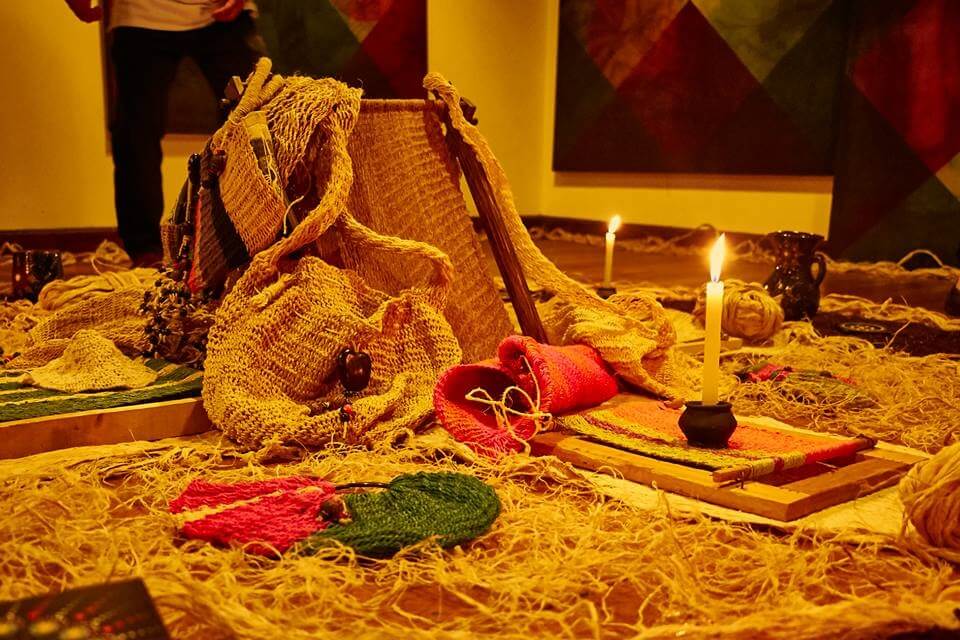
That is another issue, that same right to self-recognition of the indigenous peoples of which I spoke. The governors, every year, the indigenous governors send a census to the Ministry of the Interior that is a self-census where it says: “Look, I am governor of reservation X and these are all the people who live here. Please recognise them as indigenous.”
The update of that census is done every year from January to April so, right now, all public entities are not only asking for the governor’s certification that says if indeed so and so is indigenous, but they are also requesting the certificate stating that they are indigenous from the Ministry of the Interior, which is no more than the information provided by each governor.
But, as you well stated, these are women who, for X or Y reasons, left their territories as girls, and many people don’t know them. So, to be frank, there has been some reluctance on the part of the governors to recognise people they don’t know if they are indigenous or not.
The women know that they are indigenous because of their parents, their grandparents, but these are people who no longer exist, perhaps they died precisely taking care of what they fought for for a long time.
There is a lot of resistance towards issuing certificates now to people that they don’t know for sure are indigenous or not. That’s the first thing. The second has to do with social work, right?
There is a social community, minga work [“minga” refers to collective indigenous work]. That is another one of the reasons why the governors have put a problem there.
They don’t feel that the support of working in a project, I don’t know… from… that is, they are not working here. Working in agriculture, they don’t see them. They are not working here, that is, they are not working for the community, why? [In order to set up their own reservation, the women need to be recognised as indigenous women first. Because they left the territory, they are not given the recognition by the indigenous governors. Governors say they are not taking part in the work.]
The territory of a reservation is collective. What does that mean? The portion of land belongs to everyone and is for everyone but, precisely, because it belongs to everyone and is for everyone, we must all work the land.
For the land and for everything that being indigenous entails for their cosmovision, traditions, culture and everything else, then those are the reasons why these women haven’t had the ability to convince the governor to include them in the census.
(Narrator) According to the draft United Nations Declaration on the Rights of Indigenous Peoples, the concept of indigenous is also based on the collective identification that the indigenous people make of themselves. And therefore, of each of its members.
Self-recognition, that is, the right of the community to define its own members is an exercise of indigenous collective identity.
In short, what defines an indigenous people and determines its holistic vision of the world is the identity that it has of itself as a community that is part of nature, of creation.
Consequently, only indigenous peoples can determine who shares their cosmogonic values and who are part of its people.
These requirements, valid or not, have limited the access of these women to their institutional recognition and their enjoyment of the rights that our Constitution proclaims for native peoples.
They have faced several obstacles. Meanwhile, the circle of Awa women seeks to strengthen the women, meeting with the aim of shielding this process and reducing the cultural uprootedness that these women had to endure.
(Gladys) I don’t know why. We fought for this, and they don’t want to recognise us. I spoke with the current governor. I asked him for a certificate and no… Until now he hasn’t given it to me.
I asked for it in December and he didn’t want to give it to me. I don’t know why. He told me: “If you want me to recognise you, you must have lived there for two years. Therefore, you have no right to ask for anything.” That is what he told me.
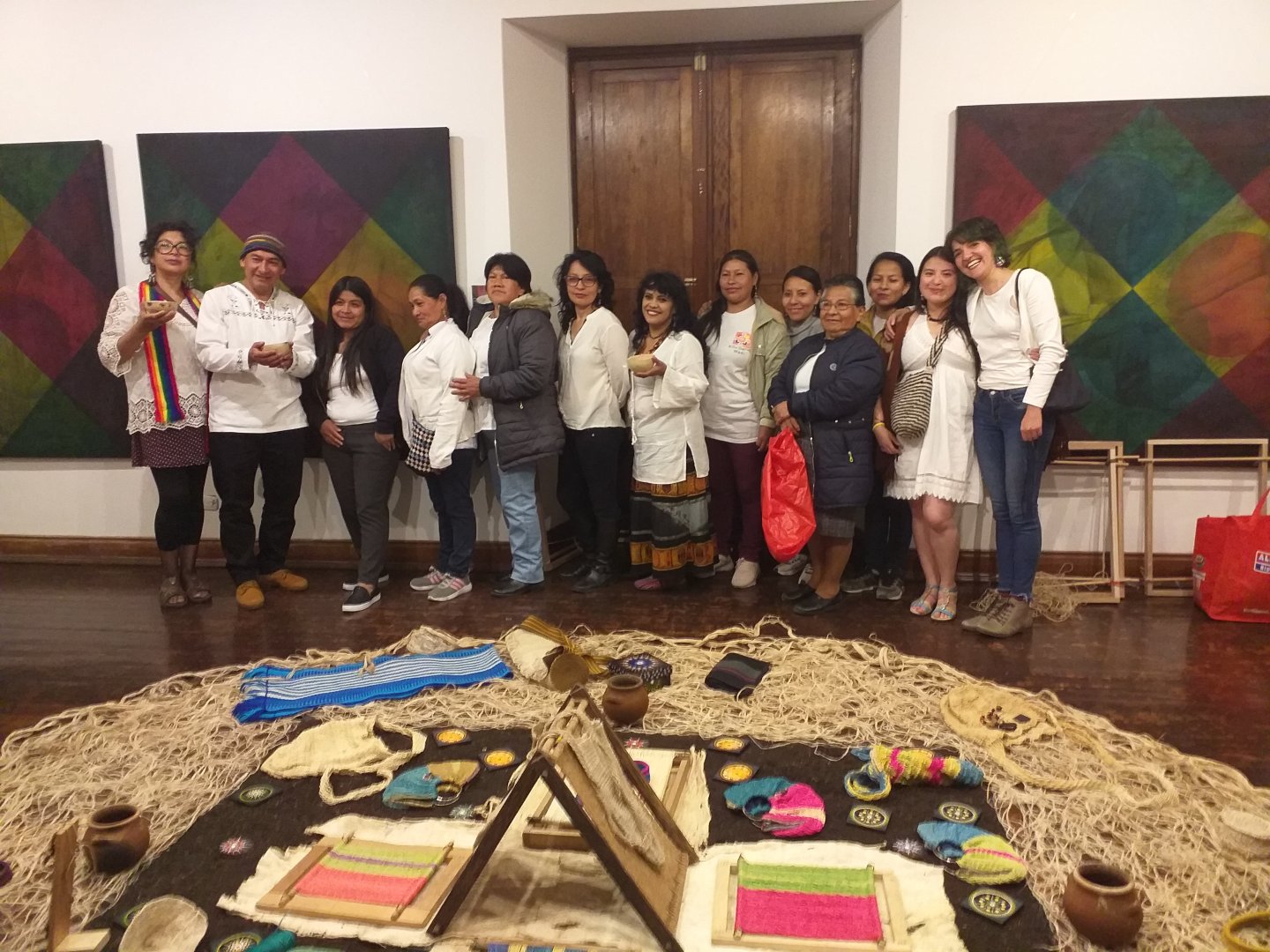
(Narrator) This autonomous process makes visible that the discrimination and the violence suffered by indigenous peoples continues to be a constant in the country.
Articulating themselves has been a way for them to heal memory, to establish themselves as a solid group, to be part of their territory with all the connotations that this entails, paradoxically being outside of it.
The right to cultural identity and its recognition in practice and in paper is the axis around which all demands and requests of these women are articulated.
In these cases, cultural identity is explained in terms of the group which in turn determines the nature of the claim. In this context, the right to decide who is who, that is the power to define oneself, is an immanent part of cultural rights that they claim to have in their own right and is more than deserved. Not only for them but also for their offspring.
We weave and come together to keep in mind what we are as indigenous women in the face of concerns and life in the city.
Weaving and talking revitalises us and helps us to strengthen physically and mentally, and it makes us feel like family, the women say.
To date, several institutions support this movement, promoting the opening of spaces for dialogue in which, among other beneficiaries, women can make known the risks and problems faced in the urban context as well as find concerted and participatory solutions.
(Gladys) I feel very happy, content. When we meet, I feel as if I were in my territory. Yes, it brings back many memories because we look at each other. We are all “no ones”. Meeting gives me peace of mind. I really miss meeting now that we can’t gather because of the pandemic.
I am Awá; the surname says it all.
They can’t deny what I am.
The podcast was originally published 2 October 2020 by Consejo de Redacción. Find the original here.
Navigating a changing world: Media´s gendered prism
IMS media reader on gender and sexuality
